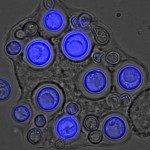Lien vers Pubmed [PMID] – 9988500
Med. Mycol. 1998;36 Suppl 1:119-28
Failures of drug treatment in fungal infections combined with improvements in performances and standardization of antifungal susceptibility testing have drawn attention to the problem of antifungal resistance and its underlying mechanisms. Resistance of Candida species and Cryptococcus neoformans to flucytosine (5FC) develops during monotherapy. Acquired resistance results from a failure to metabolize 5FC to 5FUTP and 5FdUMP, or from the loss of feedback control of pyrimidine biosynthesis. A combination of 5FC and amphotericin B (AmB) reduces the appearance of resistant C. albicans isolates. Resistance to AmB is unusual. C. lusitaniae is the most susceptible to AmB resistance. C. neoformans with decreased AmB susceptibility has been isolated from an HIV-infected patient. Acquired resistance to AmB is often associated with alteration of membrane lipids, especially ergosterol. Concomitant with the widespread use of fluconazole there have been increasing reports of fluconazole resistance in Candida species and C. neoformans. Fluconazole resistance was mostly associated with prior use of fluconazole as intermittent therapy or prophylactic continuous treatment for recurrent thrush. In contrast to fluconazole, itraconazole is active against C. krusei. Decreased susceptibility to itraconazole is observed over time in C. albicans isolates becoming resistant to fluconazole. Decreased susceptibility to itraconazole and SCH-56592 was also observed in a few Aspergillus fumigatus isolates. Failure to accumulate azole antifungals has been identified as a cause of resistance in several post-treatment C. albicans, C. glabrata and C. krusei isolates. In azole-resistant C. albicans isolates from AIDS patients with oropharyngeal candidiasis, multidrug efflux transporters of the ATP-binding cassette (ABC) superfamily and of the class of major facilitators (MF) have been shown to be responsible for the low level of accumulation of azole antifungal agents. Two genes for these transporters, the ABC-transporter gene CDR1 and the MF gene, CaMDR1 (BEN) were shown to be overexpressed in resistant C. albicans isolates. Overexpression of BEN in Saccharomyces cerevisiae conferred resistance to fluconazole and terbinafine. CDR1 overexpression in S. cerevisiae conferred cross-resistance to fluconazole, itraconazole, ketoconazole and terbinafine. C. albicans clinical isolates resistant to azole antifungal agents over-expressing the ABC-transporter genes CDR1 and CDR2 were less susceptible to the morpholine derivative amorolfine. In C. glabrata isolates azole resistance is based on over-expression of the CgCDR gene. A reduced susceptibility of ergosterol biosynthesis is another mechanism of resistance described in a number of post-treatment C. albicans, C. neoformans and Histoplasma capsulatum isolates. Mutations have been reported in the CYP51A1 genes of resistant C. albicans isolates. Over-expression of CYP51A1 in C. albicans and C. glabrata may also account for a decreased susceptibility to azole antifungal agents.

